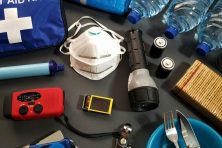5 Ways to Cope With Coronavirus Isolation Without Wrecking Your Finances

For many of us, taking precautions against COVID-19, the disease caused by the new coronavirus, means washing our hands all the time and hunkering down at home to avoid contact with potential sick people.
Those disease-avoidance tactics sound basic, but dealing with a viral outbreak is no simple task. It’s also no small matter to stock up on supplies at a time when you might be losing income due to sick days.
Your coronavirus concerns may have you dipping into your emergency fund and that’s okay. Those savings are meant to help you in situations that are unexpected and urgent. This circumstance pretty much fits that bill.
Still, we’ve got some suggestions to help you avoid overspending while taking coronavirus isolation precautions.
1. Stock up on Stuff That Will Last
You may find you can’t get out to the grocery store for an extended period of time, whether that’s due to your own isolation preferences or public officials’ recommendations.
Stock up on nonperishable food — items that are shelf stable or frozen — to avoid wasting money on stuff that spoils quickly. Think about what you could easily make to eat if you weren’t feeling well. Save money by buying in bulk, choosing cheaper store-brand items and taking advantage of BOGO deals or coupons.
Don’t forget to grab enough household supplies too — like soap and toilet paper — in addition to cold medicine, cough drops and anything to help you power through if you start to experience acute symptoms of the virus.
Instead of stocking up on Tylenol, Advil, Dayquil or TheraFlu, save money by buying the generic versions. The U.S. Food and Drug Administration requires generic drugs to have the same active ingredients as their name-brand counterparts, and generic drugs are often significantly cheaper.
Basically, you’re getting the same product but spending less.
2. Avoid Unnecessary Spending
The Centers for Disease Control has been urging Americans not to buy face masks and to save them for the health workers who need them. Another item you can leave off your list: hand sanitizer — especially overpriced sanitizer. Washing your hands with soap and water for at least 20 seconds is more effective anyway.
Because no one can predict how long the spread of COVID-19 will last, it’s good to be mindful about nonessential spending in case you need to conserve money for healthcare or other necessities. You may feel inclined to buy stuff to keep you (or your kids) entertained at home, but try not to go overboard.
3. Choose Curbside Pick-Up
Having groceries and supplies delivered limits your interactions with others, but delivery service comes at a price. Free curbside pickup options help you avoid store aisles and delivery fees. National retail giants Walmart and Target offer this service.
Your regional grocers may offer a similar service. For example, some Publix, Aldi, H-E-B and Kroger locations provide curbside pickup — though you may incur a fee. Other stores let you shop online with free in-store pickup. You still have to leave your car and go into the building, but you don’t have to spend time going from aisle to aisle, passing a bunch of people on the way.
4. Have Prescription Refills Mailed to You
If you have a pre-existing condition that requires daily medication, you don’t want your supply to run out before you can get a refill. Experts recommend having a 30-day supply of essential medications.
Arranging for prescription delivery before you run out is a smart proactive measure. You can often get 90-day prescriptions mailed to you. CVS Pharmacy recently announced it will be waiving delivery charges for prescription medications due to the coronavirus outbreak.
If your insurance has a limit on how much of your medication you can get at a time, you could appeal that by submitting a quantity limit exemption form with a note from your doctor about why you need a longer supply. There may also be drug alternatives without insurance-imposed quantity limits. Ask your doctor about your options.
5. Visit the Doctor Virtually
Seeking medical care doesn’t always require going into an office full of sick people. Whether you suspect you’re experiencing coronavirus symptoms or you have a completely unrelated ailment, you may be able to take advantage of telehealth services.
Check with your insurance company to see if you can meet with a doctor virtually. The physician might ask you to take your vitals (like your temperature) and will assess your condition through video chat or a simple phone conversation. You may also find your telehealth consultation costs substantially less than your regular doctor’s office copay.
If you do suspect you’ve contracted COVID-19, many insurers are now waiving costs for testing.
Nicole Dow is a senior writer at The Penny Hoarder.












